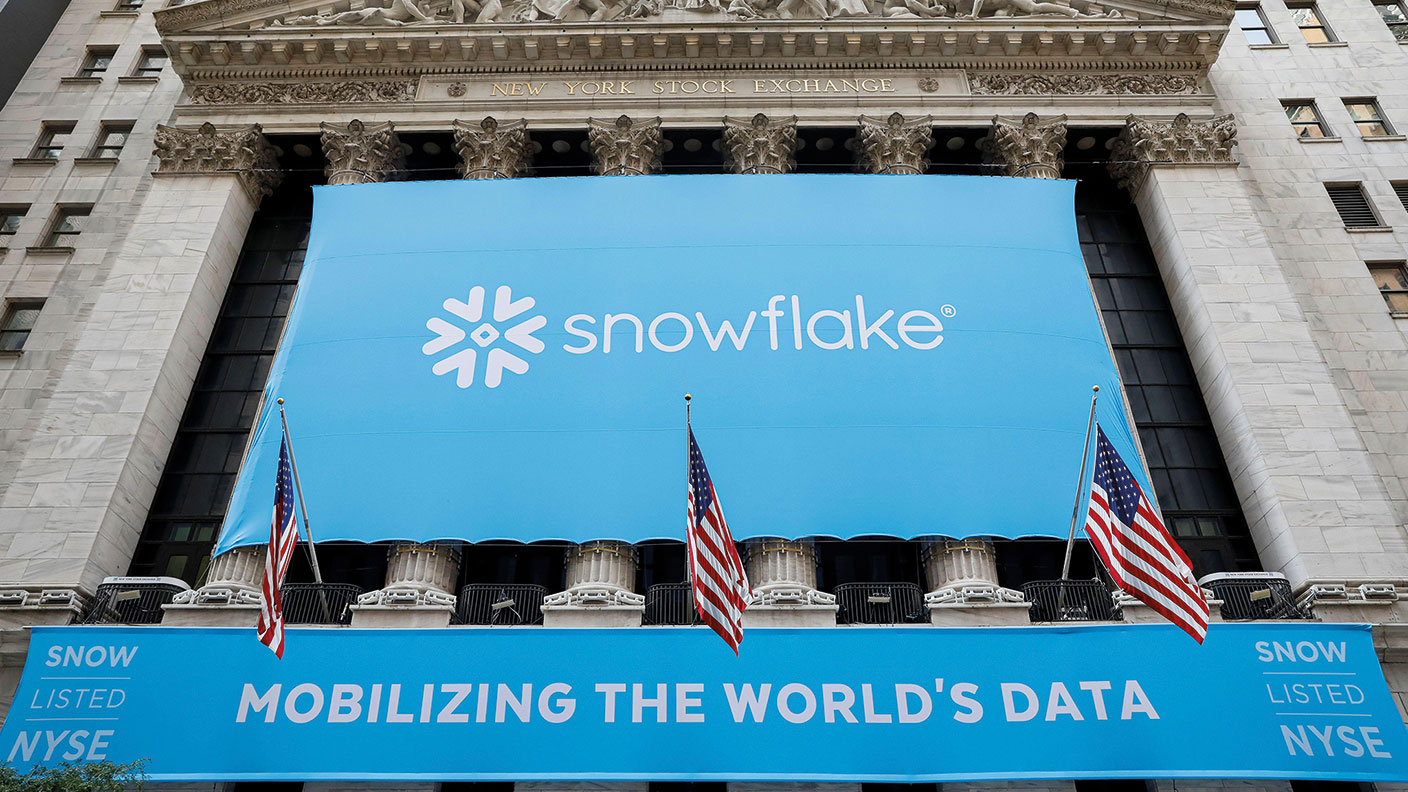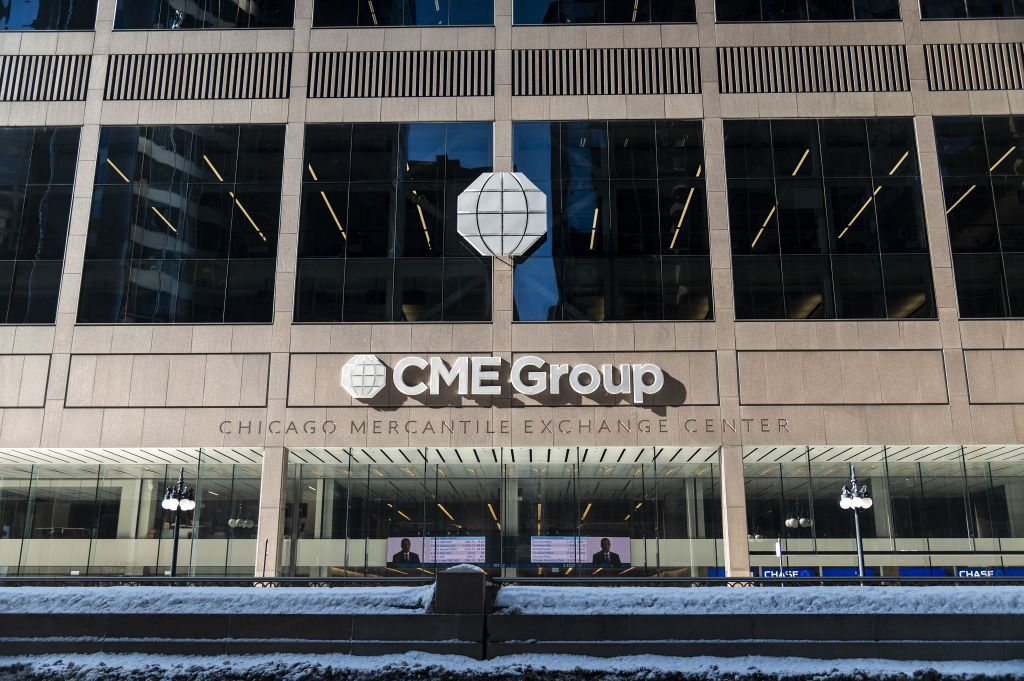Trading: short Snowflake, a company with its head in the clouds
Cloud-computing company Snowflake is absurdly overvalued and its bubble is starting to burst. Matthew Partridge picks the best way to play it.


Get the latest financial news, insights and expert analysis from our award-winning MoneyWeek team, to help you understand what really matters when it comes to your finances.
You are now subscribed
Your newsletter sign-up was successful
Want to add more newsletters?
We are in the middle of an unprecedented technology boom, especially in the US, with the tech-heavy Nasdaq Composite index doubling in just over two years. Of course, this is not entirely irrational. For example, some companies, notably Facebook, Google and Amazon, have managed to deliver on the promises made over a decade ago.
Low long-term interest rates have also increased the value of future profits, while a case can be made that the pandemic has accelerated genuine long-term changes in the way that we shop, consume goods and services, and work.
Nevertheless, several stocks have surged so far that it seems investors are willing to throw lots of money at anything that looks vaguely plausible. Perhaps the most egregious example is data company Snowflake (NYSE: SNOW), the largest initial public offering (IPO) of 2020.
Try 6 free issues of MoneyWeek today
Get unparalleled financial insight, analysis and expert opinion you can profit from.

Sign up to Money Morning
Don't miss the latest investment and personal finances news, market analysis, plus money-saving tips with our free twice-daily newsletter
Don't miss the latest investment and personal finances news, market analysis, plus money-saving tips with our free twice-daily newsletter
When its backers announced that they were taking it public, brokers expected it to be priced at $75 a share. However, demand was so great in the run-up to the listing that the shares were ultimately priced at $120. On its first day of trading it opened at double that amount. The price then continued to rocket, gaining 50% to a peak of $375 last month.
Snowflake’s sales doubled in 2020
Snowflake is a cloud-computing company. It makes most of its money from software that allows companies to store and analyse large data sets remotely. The idea is that in a world where everyone is working from home, or small offices, such storage and analytic services will be in demand.
Sales more than doubled last year and are expected to double again in 2021 – and again in 2022. Snowflake is also notable for having attracted initial funding from Berkshire Hathaway, the holding company run by the famous US investor Warren Buffett.
This all certainly sounds compelling, but if you look a bit more closely, the stock appears much less attractive. While cloud computing is a genuinely big investment theme, Snowflake faces strong competition from a range of operators, including large, established players such as Amazon (which dominates the market through Amazon Web Services).
Not only has Snowflake failed to make money so far, but it will also have an uphill struggle to justify a valuation of over 200 times 2021 sales. Warren Buffett’s endorsement looks far less impressive when you remember that he made his reputation by investing in cash-generating companies in strong, established sectors, not moonshot technology companies.
It now appears that even Snowflake’s cheerleaders are beginning to tire of the company, with the price melting down by 20% in recent weeks to the current level of $306. Still, I would advise you to wait just a little longer, shorting the stock at £7 per $1 when it falls below $280. In that case, I suggest you cover your position if the share price rises above $420, which gives you a potential downside of £980.
Trading techniques: the Super Bowl indicator
Last Sunday saw the Tampa Bay Buccaneers beat the Kansas City Chiefs in the 55th Super Bowl. Traders who believe in the Super Bowl indicator will be pleased.
This is because the indicator suggests that the US stockmarket tends to perform better after a team from one of the two key leagues, the National Football Conference (NFC), beats a team from the other, the American Football Conference (AFC) in the big game. Since Tampa Bay is in the NFC, this should be good news for equities.
There does seem to be something to this theory. According to Russ Mould of AJ Bell, on the 27 occasions teams from the NFC won, the stockmarket returned an average of 10.5% in the following year – but an average of only 6.9% a year after the 27 AFC victories.
However, Mould points out that this may be because the AFC teams were dominant during the 1970s when stagflation depressed stocks, while teams from the NFC won 13 consecutive Super Bowls during the bull markets of the late 1980s and 1990s.
What’s more, those who have placed their trust in Super Bowl theory have done badly over the last 20 years, with the market returning 9.17% on average after AFC victories, compared with only 2.76% after NFC wins. The main lesson is to ignore theories and indicators without an underlying financial rationale.
How my tips have fared
Four of my five long tips have gained in the past fortnight. Media group ITV went up from 102p to 108p and transport group National Express rose from 244p to 301p.
Pub group Mitchells & Butlers increased from 277p to 348p, while cruise-ship company Norwegian Cruise Lines climbed from $23.97 to $25.01. However, while building company Bellway advanced from 2,803p to 3,114p, it briefly fell below the stop-loss level of 2,750p, so you would have had to close it there, taking profits of £780. Still, even excluding the profits on Bellway, my four longs are making a total net profit of £5,610.
The short tips were more of a mixed bag. Online insurance broker eHealth slipped from $82.97 to $57.37. Electric lorry-maker Nikola advanced from $20.74 to $23.50. Online furniture retailer Wayfair fell from $294 to $289. Social-media network Twitter increased from $48 to $58, which meant that you would have covered your position at $56.20 for a loss of £980.
Online grocer Ocado fell from 2,800p to 2,688p, and food-delivery platform DoorDash decreased from $191 to $177. GameStop hasn’t yet fallen below $50, the level at which I suggested you start shorting it. Overall, excluding Twitter, my short tips are making a profit of £1,485.
The closure of Bellway and Twitter leaves me with four long tips (ITV, National Express, Mitchells & Butlers and Norwegian Cruise Line), and five shorts (eHealth, Nikola, Wayfair, Ocado and DoorDash), with GameStop and Snowflake yet to be triggered. I suggest you close your Wayfair short, since it is losing money after more than six months, taking losses of £161. Raise the stop- losses on National Express and Mitchells & Butlers to 275p and 300p respectively.
Get the latest financial news, insights and expert analysis from our award-winning MoneyWeek team, to help you understand what really matters when it comes to your finances.

-
 Do you face ‘double whammy’ inheritance tax blow? How to lessen the impact
Do you face ‘double whammy’ inheritance tax blow? How to lessen the impactFrozen tax thresholds and pensions falling within the scope of inheritance tax will drag thousands more estates into losing their residence nil-rate band, analysis suggests
-
 Has the market misjudged Relx?
Has the market misjudged Relx?Relx shares fell on fears that AI was about to eat its lunch, but the firm remains well placed to thrive
-
 Should you sell your Affirm stock?
Should you sell your Affirm stock?Affirm, a buy-now-pay-later lender, is vulnerable to a downturn. Investors are losing their enthusiasm, says Matthew Partridge
-
 Profit from pest control with Rentokil Initial
Profit from pest control with Rentokil InitialRentokil Initial is set for global expansion and offers strong sales growth
-
 In the money: how my trading tips fared in 2025
In the money: how my trading tips fared in 2025The success of the open positions offset losses on closed ones, says Matthew Partridge
-
 Coreweave is on borrowed time
Coreweave is on borrowed timeAI infrastructure firm Coreweave is heading for trouble and is absurdly pricey, says Matthew Partridge
-
 Circle sets a new gold standard for cryptocurrencies
Circle sets a new gold standard for cryptocurrenciesCryptocurrencies have existed in a kind of financial Wild West. No longer – they are entering the mainstream, and US-listed Circle is ideally placed to benefit
-
 Profit from other investors’ trades with CME Group
Profit from other investors’ trades with CME GroupCME Group is one of the world’s largest exchanges, which gives it a significant competitive advantage
-
 Investors need to get ready for an age of uncertainty and upheaval
Investors need to get ready for an age of uncertainty and upheavalTectonic geopolitical and economic shifts are underway. Investors need to consider a range of tools when positioning portfolios to accommodate these changes
-
 How much gold does China have – and how to cash in
How much gold does China have – and how to cash inChina's gold reserves are vastly understated, says Dominic Frisby. So hold gold, overbought or not